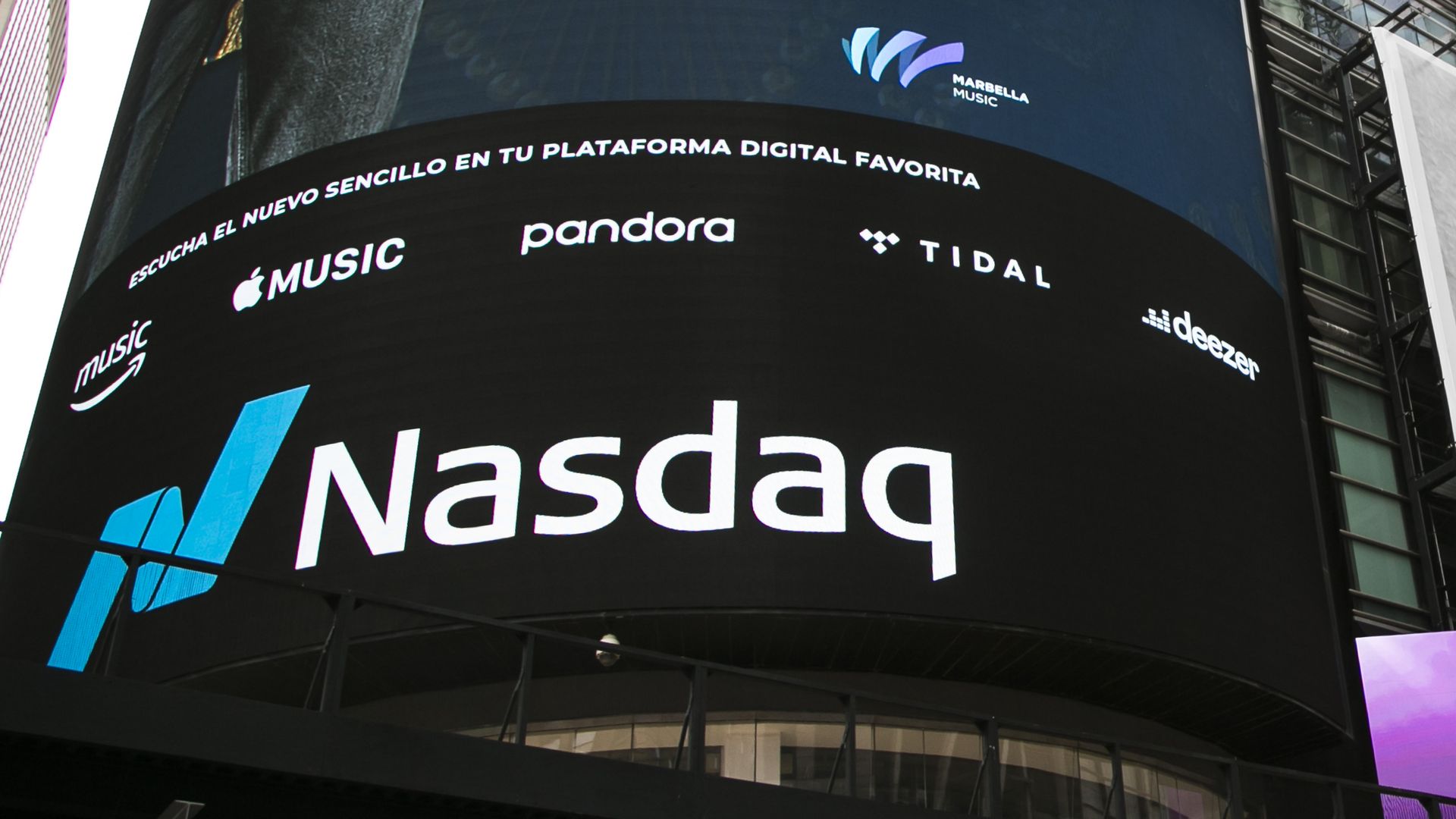| | | | | | | Presented By OurCrowd | | | | Axios Markets | | By Sam Ro ·Jul 21, 2021 | | Today's newsletter is 1,218 words, < 5 minutes. 📉 of the day: 430,000, the number of subscribers Netflix lost during the second quarter in the U.S. and Canada. | | | | | | 1 big thing: Stocks and bonds tell similar stories |  | | | Illustration: Megan Robinson/Axios | | | | Treasury yields have been falling, and yet stock prices remain near record highs. On the surface, this seems like conflicting attitudes toward risk. But a closer look at these markets reveals a much more consistent narrative. Why it matters: Since March, long-term Treasury yields have been sliding, with the 10-year yield falling from 1.74% in late March to as low as 1.13% on Monday. - Most market watchers agree this reflects an aversion to risk.
Driving the news: The spread of COVID variants has been troubling. And among other things, it risks disrupting economic growth. - "I think we were pricing in the world going back to normal," Roberta Goss, co-head of the bank loan and CLO platform at Pretium, tells Axios. "But it's not 'normal.' It's not going to be normal for quite some time, and the path to normal is not linear."
Between the lines: While the major stock indexes are near record highs, the relative performance of certain categories of stocks reflects a shift toward more cautious positioning. Flashback: In what's been dubbed the "reflation trade," traders bullish on the reopening of the economy had been showing a preference for stocks that are more sensitive to shorter-term bouts of growth — or cyclical growth. - In this environment, small-cap stocks are preferred over large-cap stocks. Meanwhile, Big Tech stocks, which are defined by longer-term — or secular — growth fell out of favor.
What they're saying: Capital Economics analyst Jonas Goltermann observed that for most of the second half of 2020 as Treasury yields were rising, the Russell 2000 index of U.S. small-cap stocks outperformed the large tech-heavy Nasdaq. - This continued into spring 2021 until yields peaked and then turned lower — and the Russell 2000 started to lag the Nasdaq, a trend that's lingered to this day.
The big picture: The major stock market indexes like the Dow and S&P 500 offer a limited view of what's going on in the economy. Underlying these indexes are dozens of industries and thousands of companies that all have unique stories to tell. The bottom line: Both the bond market and stock market reflect more cautious behavior by investors and traders. |     | | | | | | 2. Catch up quick | | Netflix's global paid subscriber base grew by more than expected in Q2, and it confirmed that it was expanding into gaming. (CNBC) Chipotle Mexican Grill reported stronger-than-expected sales in Q2 as diners returned to its restaurants. (Yahoo Finance) JPMorgan Chase granted CEO Jamie Dimon a "special award" award of 1.5 million options to stay at the bank. (FT) |     | | | | | | 3. One-on-one with Joe Ucuzoglu, CEO, Deloitte US |  | | | Joe Ucuzoglu; Photo: Deloitte | | | | "It's a period of great change in the relationship between individuals and their employers." As CEO of a firm that advises thousands of the biggest U.S. companies, Joe Ucuzoglu knows all about the Great Resignation, Axios' Kate Marino writes. - "'The Great Resignation' is really an appropriate descriptor," he says, attributing the phenomenon in part to the very real pent-up demand to change jobs — or even careers — that's been simmering over the last year.
- It's also much more. Tech innovation pulled forward by the pandemic has boosted economic growth prospects — so companies need more workers to meet demand.
"We're seeing a period of technological change that is at the most rapid pace in our history. And it's creating more jobs, more of a need for great people, because the technology is … making them more productive." - "It's disproving a lot of the fear out there over the impact of technology on jobs," he says.
State of play: "This is the hottest talent market that most of us have ever seen ... In this type of market, workers have a lot of leverage," he adds. - "Companies are having to do a whole multitude of things to attract people, to retain them, and to differentiate, and dollars are just one piece of it. It's about benefits, it's about purpose, it's about flexibility."
- At Deloitte, that's meant additional paid child care support, more flexible days off, even a five-day "collective disconnect" over the July 4 weekend.
Of note: One side effect of the pandemic that Ucuzoglu hopes remains — more leeway for risk-taking. - "Out of necessity, you had to get really innovative and take some risks last spring, because otherwise, you couldn't operate. So everybody did all the stuff that historically, you would have formed a task force, studied it, come up with 93 reasons why it can't work."
That risk-taking paid off for loads of companies, he says. - "I do see companies now making this explicit, trying to build the tone that 'we want our people to go out and take some chances. We want creativity to translate into ideas that we experiment with.'"
|     | | | | | | A message from OurCrowd | | Digitized scents are reimagining the billion dollar fragrance market | | |  | | | | Digitized scents are reimagining the billion dollar fragrance market Moodify's patented technology creates advanced functional scents that generate a behavioral response, on-demand. Improve performance, enhance well-being, or eliminate the perception of bad odors––this is the future of fragrance. Explore Moodify's investment potential at OurCrowd. | | | | | | 4. Employees don't realize how much power they have |  | | | Illustration: Sarah Grillo/Axios | | | | Speaking of the shifting power dynamics between employees and their bosses, Kate writes, here are two stats from Deloitte's 2021 Human Capital Trends report, out today and first provided to Axios: - About 86% of 395 executives surveyed said they believe workers will gain greater independence and influence relative to their employers in the future.
- However, just 63% of the workers surveyed felt that their relationship with their employer will stay the same or become a stronger partnership.
Why it matters: The perception gap between the two groups shows that some employees may not even realize how strong of a hand they currently have. |     | | | | | | 5. Nasdaq gets serious about private-company share trading |  | | | Photo: Pablo Monsalve/VIEWpress via Getty | | | | It's one of the biggest competitions out there: Who will be the go-to platform for buying and selling stock in private companies? A consortium of giant banks is now teaming up with Nasdaq to try to ensure that the answer is to be found on Wall Street, rather than in Silicon Valley, Axios Capital author Felix Salmon writes. Why it matters: No matter how many companies go public, the total valuation of private companies only ever seems to go up rather than down. Which means there's big money to be made in trading stakes in those companies. The big picture: More than $2 trillion in wealth is tied up just in the equity of unicorns — private companies worth more than $1 billion. Many early employees and other shareholders would love to sell at today's valuations, while a long list of investors is desperate for any opportunity to buy some of the world's hottest and fastest-growing companies. Flashback: The company with the greatest-ever volume of pre-IPO share trading was almost certainly Facebook. Its shares were traded on a platform called SecondMarket, which was later sold to Nasdaq and became Nasdaq Private Market. - Nasdaq said Tuesday that it's spinning out Nasdaq Private Market into a separate, stand-alone company. Further investment in the new entity is coming from some of Wall Street's biggest names: Citigroup, Goldman Sachs, Morgan Stanley and SVB Financial Group.
Where it stands: There's a lot of competition in the space. Retail investors are served by companies like OurCrowd, MicroVentures and EquityBee, while institutions use platforms such as EquityZen — when they're not negotiating directly with companies or going via big investment banks. By the numbers: One of the largest institutional players, Carta, recently raised money at a $7.4 billion valuation. The bottom line: It's not too late for one platform to dominate the asset class. Most buyers and sellers will naturally gravitate to the venue with the greatest liquidity and the deepest client book, creating a winner-takes-all dynamic. - With Tuesday's announcement, Nasdaq is putting Carta on notice that it intends to be that winner.
|     | | | | | | A message from OurCrowd | | Software-created scent is revolutionizing the fragrance industry | | |  | | | | Invest in the next great fragrance innovation at OurCrowd. Moodify leverages 15 years of academic research to create scents that help improve mental performance, well-being, and more––altering the multi-billion dollar fragrance industry. Explore Moodify's investment potential. | | |  | | It'll help you deliver employee communications more effectively. | | | | | | Axios thanks our partners for supporting our newsletters. If you're interested in advertising, learn more here.
Sponsorship has no influence on editorial content. Axios, 3100 Clarendon Blvd, Suite 1300, Arlington VA 22201 | | | You received this email because you signed up for newsletters from Axios.
Change your preferences or unsubscribe here. | | | Was this email forwarded to you?
Sign up now to get Axios in your inbox. | | | | Follow Axios on social media:    | | | | | |
No comments:
Post a Comment